
Working in a World of Hurt: Trauma and Resilience in the Narratives of Medical Personnel in Warzones
(Hardback)
Publishing Details
Working in a World of Hurt: Trauma and Resilience in the Narratives of Medical Personnel in Warzones
By (Author) Carol Acton
By (author) Jane Potter
Manchester University Press
Manchester University Press
1st July 2015
United Kingdom
Classifications
Professional and Scholarly
355.3450904
Physical Properties
Hardback
280
Width 138mm, Height 216mm
Description
Working in a world of hurt fills a significant gap in the studies of the psychological trauma wrought by war. It focuses not on soldiers, but on the men and women who fought to save them in casualty clearing stations, hospitals and prison camps. The writings by doctors, nurses, ambulance drivers and other medical personnel reveal the spectrum of their responses that range from breakdown to resilience. Through a rich analysis of both published and unpublished personal from the First World War in the early twentieth century to Iraq in the early twenty-first, Acton and Potter put centre stage the letters, diaries, memoirs and weblogs that have chronicled physical and emotional suffering, many for the first time. Wide-ranging in scope, interdisciplinary in method, and written in a scholarly yet accessible style, Working in a world of hurt is essential reading for lecturers and students as well as the general reader. -- .
Reviews
Acton and Potter have embarked upon a refreshing interdisciplinary approach to reading wartime narratives, by focusing on those whose history lies concealed, those who served as medical personnel in warzones (p. 2). It chronicles the writings and memories of medics, largely British and American, including nurses, field medics, ambulance drivers, doctors and surgeons. The chapter structure chronologically traces their experiences from the First World War, through the Second World War, the Vietnam War, and concludes with a nod to the memoirs of Iraq War veterans. The authors have adeptly communicated the ways in which medical narratives of trauma and resilience are distinct from those of combatants and directly related to the medical duties they performed. Despite identifying some universal characteristics in medics narratives, the authors have also firmly grounded their analysis in specific historical, cultural and medical contextsOverall, the prose is fluid, sophisticated and confident throughout.
Nicole Cassie, University of Glasgow, War in History, Vol. 24, No. 3
'[] an excellent and necessary intervention into two important aspects of cultural history: those of medicine and warfare. In synthesizing an impressive range of primary sources with such confidence and coherence, Acton and Potter have written a book that must form essential reading for any scholar working on the histories of war, medicine, or trauma.'
First World War Studies
Author Bio
Carol Acton is Associate Professor of English at St Jeromes University at the University of Waterloo
Jane Potter is Reader in Arts at Oxford Brookes University
